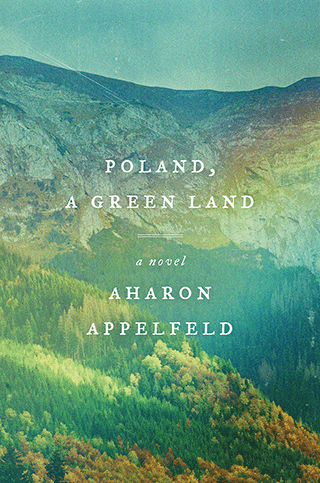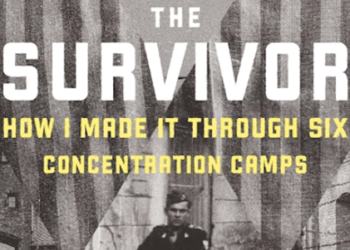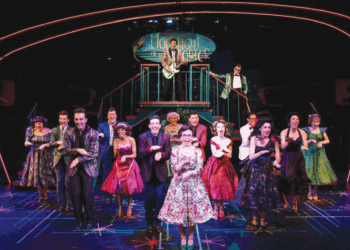Reviewed by NEAL GENDLER
From early childhood, prosperous Tel Aviv shop owner Yaakov Fein heard his parents talk wistfully with friends about life in their Polish village of Szydowce, from which they escaped death.
One day, he decides it’s time to see it.
“What on earth for,” asks exceptionally practical wife Rivka, who’d inherited her survivor parents’ housewares store and property investments.
“I must,” he replies. She calls it madness, asking what he’ll find there. “Everything,” he says.
He says he’ll be gone 10 days — two weeks at most.
What could go wrong?
Well, nothing we’d predict. Yaakov has difficulty trying to buy Jewish tombstones paving Szydowce’s town square, but the late, masterful author Aharon Appelfeld, in his 23rd and perhaps final book, takes his time getting to the real trouble: Yaakov slowly realizes his life choices have been wrong.
He’d inherited his father’s shop, moving it from fabrics to fashion, and is an IDF reserve captain happy when leading troops.
“Still, something was missing,” Appelfeld writes. Rivka was emotionally remote, and Yaakov sometimes felt lonely. “He hadn’t felt this lack, if that’s what it was, in his youth.”
His parents had told Israeli-born Yaakov little about their Shoah experiences — only his mother when he was too young to remember — and he hadn’t asked. But he’d heard them talk at home with fellow villagers. He had nightmares. His parents spoke mostly in Yiddish, but at night they spoke privately in Polish that he’d picked up.
Yaakov leaves quickly, flying to Warsaw, lingering contentedly in Krakow amid unaccustomed greenery, and hiring a taxi to tiny Szydowce. Just outside town, he rents room and board from Magda, a farmer long divorced from an abusive drunkard, and her daughter Maria.
His first morning, he walks into town, buying them presents, and Magda asks how he knows Polish. She asks where he’s from. He replies: “From here.”
“I don’t understand,” Magda says.
“My parents and grandparents were born in Szydowce,” Yaakov says. “Perhaps you knew the Fein family?”
“Oh, my God, I can’t believe what I’m hearing,” Magda says. “Knew them? I knew them better than I knew my own parents. When I was a girl, I worked for your grandparents at their house and at their shop.” She leaves the room weeping.
Returning, she says: “In my dreams I never imagined that I would get to see any of you. God sent you to me.”
Magda teaches Yaakov about the family he never knew, the esteem in which his grandfather and great-grandfather were held and her love for the family and its way of life. “I was at your grandparents’ house every day,” she says. “They were like parents to me,” providing clothes, books and tenderness absent at home.
She’d retained some of her Yiddish, one day singing Yaakov the classic “Raisins and Almonds” he’d heard at his parents’ gatherings.
Knowing Jewish practice, she feeds nonreligious Yaakov fresh vegetarian food, often like his mother’s.
Improbable coincidence? But it’s a novel, smoothly translated by Stuart Schoffman. Poland is deceptively easy to read — nary a fancy or excess word — but ease cloaks a tension-building intensity.
“Yaakov’s arrival had brought back … people she had loved,” including her childhood best friend, Yaakov’s beautiful aunt, Bronka. A few years older, she’d taught Magda history and arithmetic. Bronka became a fervent Communist, breaking her parents’ heart by moving to Krakow. A year before the war, she was sent to Moscow and disappeared.
Yaakov passes days strolling happily around the countryside his parents knew, visiting the nearby, gentle river they’d enjoyed and, from intelligent and forthright Magda, learning more daily about his family.
His parents “had always seemed exhausted, steeped in a gloomy world; now they came back to life,” Appelfeld notes. “Here, in their native land, they stood taller. They returned to what they had been, without the painful silences that had been planted in them by the war.”
A darker tone emerges when Yaakov visits century-old Wanda, who’d been invited to his parents’ wedding. Wanda tells him of her love for his family and the horrible way Szydowce’s Jews were killed. She says: “For some reason, Jews arouse the darkness in people.”
Yaakov begins to notice. Smiling, pleasant conversations sometimes devolve into talk of Jews as cunning, deceitful and greedy, reminiscent of a cynical, unfair saying of many Jews decades ago: “Scratch a [gentile] and you’ll find an antisemite.”
Yaakov ignores the growing wariness about him as he and Magda realize their deepening attraction. He feels “as if they’d been waiting for each other for years,” Appelfeld says. “Magda didn’t deny it.”
One evening Magda appears before dinner “wearing a lace blouse that favored her neck and chest, a black skirt and high-heeled shoes,” Appelfeld says.
“Maria went to her aunt in the mountains,” she tells Yaakov. “We’re alone.” Yaakov gets the message.
There’s much more, as Yaakov indeed finds “everything” — everything he’d been missing.
And in so doing, he finds himself.
***
Neal Gendler is a Minneapolis writer and editor.
(American Jewish World, August 2023)





















